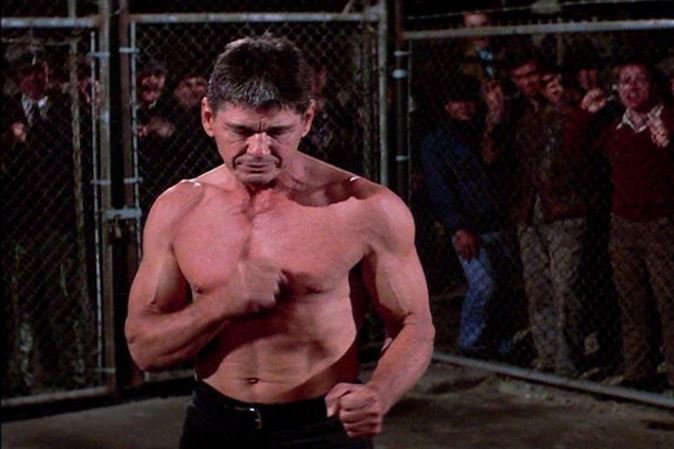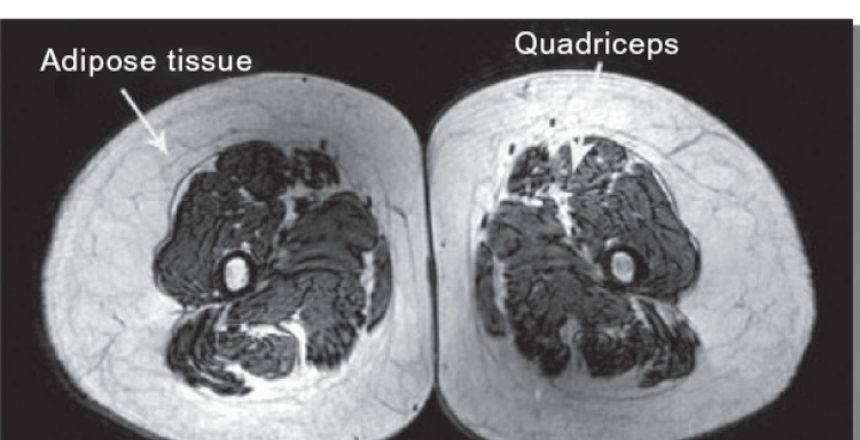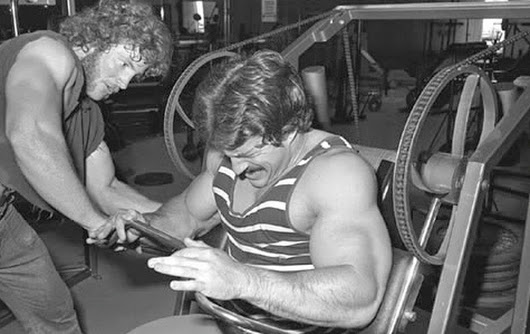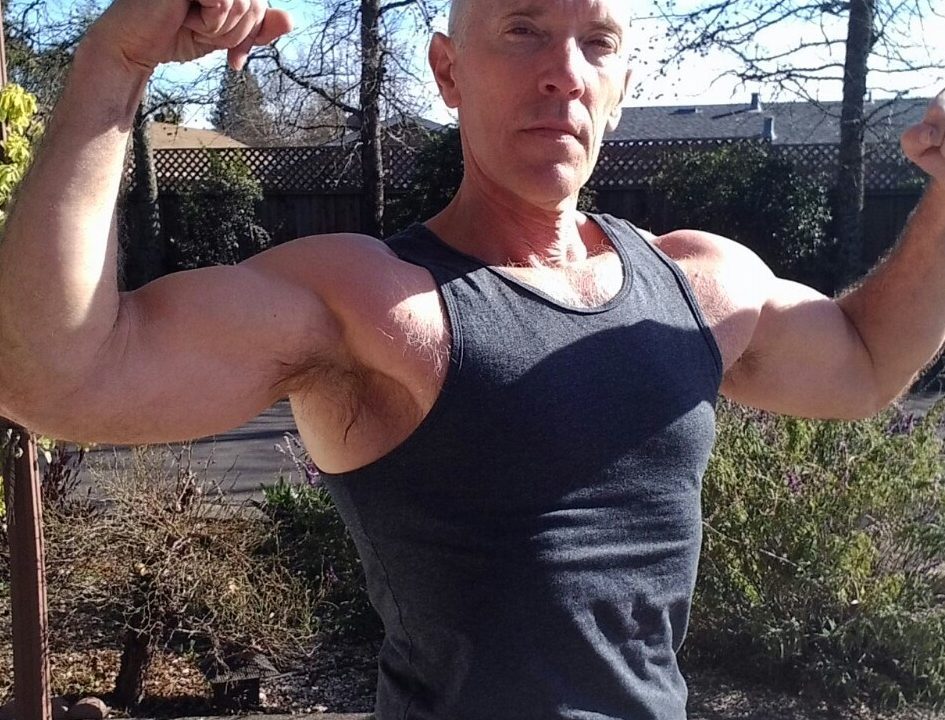We lose muscle as we age
One of the striking facts about men as we age is that we become less physically masculine: we lose the energy that young men have, our testosterone, the hormone that makes us men, declines, and we lose large amounts of the muscle mass that characterizes male bodies. All of these are associated with increases in body fat, insulin resistance, and a decline in exercise capacity.
To avoid the pitfalls and perils of aging and the diseases that go with it, it is imperative to retain muscle, and along with it the hormones and energy that characterize a fit man.
A paper published a few years ago looked at the effects of testosterone and growth hormone therapy on lean mass and fat mass in men, average age 70: Testosterone and Growth Hormone Improve Body Composition and Muscle Performance in Older Men. (Journal of Clinical Endocrinology and Metabolism.) This study is far more interesting for what it means to be a sedentary old man than for the effects of testosterone and HGH, which are about what you’d expect.
The average muscle loss in men between the ages of 50 and 70 is 30% (from the paper), and from ages 70 to 80, another 20 to 30% of muscle is lost. Add those figures and you’ve got the basis for the fact that most 80-year-old men will have lost 50% of their muscle mass.
Testosterone and growth hormone supplementation increase muscle mass, decrease fat mass
The men were randomized to receive transdermal testosterone, 5 or 10 g/d, along with growth hormone, 0, 3, or 5 μg/kg per day, for 16 weeks.
The men in the study had a testosterone level of less than 550 ng/dl.
The men also had serum IGF-1 levels in the lower tertile of adult male levels.
Testosterone and HGH supplementation performed as expected. The men getting T at 10 g/d along with growth hormone at 5 μg/kg per day – the highest doses – had the maximum results, gaining lean mass to the tune of nearly 3 kg (6.6 lbs), and losing fat mass of nearly 2.5 kg (5.5 lbs). That was in 4 months time, with no exercise.
Great results, right?
These men were sedentary, ate wrong, and out of shape
How much were these men’s low T and IGF-1 levels due to not only being old, but sedentary, overweight (average BMI 27.4) and eating wrong? I believe the lifestyle factors of diet and exercise have everything to do with it.
Consider the lean mass gains and fat mass losses of the best performing group. I could take a newbie weightlifter, even one who is 70 years old, and put him on a diet and training program through which he would easily gain 6.6 lbs of muscle and lose 5.5 lbs of fat in 4 months. When I started lifting – admittedly at age 55, not 70 – I put on 30 lbs of muscle in the first 9 months, and 35 in a year. I didn’t have much fat to lose, so I didn’t. And I’m not a gifted athlete either, I’m average. I merely trained consistently and correctly, and ate my fill of a low-carb, paleo-style diet, allowing myself occasional cheats, like baked potatoes and alcohol. I did a few weight-gain tricks, like drinking 8-ounce glasses of half-and-half.
Likewise, the men’s low IGF-1 levels may have been caused by a poor diet, filled with junky refined carbs and sugar, and lacking in protein.
How do I know that these men had poor diets? Because almost everyone does.
The point being, these men had let themselves go.
Now, there’s a circular quality to these hormones and the condition these men were in. Obesity will lower your T levels, but lowering T levels can make you obese. Similarly, lowering your muscle mass through aging and no exercise will lower growth hormone, but lowering growth hormone also has adverse effects.
But I have no doubt that, absent debilitating injuries or illness, the 70-year-old men in this study need never have gotten into such shape, and they may very well not have needed the hormonal intervention just to keep themselves from falling apart.
Testosterone replacement therapy is fine if needed, but in my view shouldn’t be used as a substitute for poor lifestyle. Growth hormone is another story, and likely is a pro-aging hormone.
To show what’s possible as men age, here’s Charles Bronson at age 54:

Men don’t have to become soft, tired, and depressed as they age. With a bit of effort, you could look more like Bronson.
Don’t be a victim of muscle loss, it can kill you
These 70-year-old men were in the beginning stages of frank sarcopenia, which could make their golden years a lot less golden, making them take refuge in a nursing home due to frailty, as well as shortening their lives.
You see old men all around who look like they’ve lost all zest for living: bent over, most of them overweight, no energy, looking forward to another night of crap food and TV.
It need not be that way.
PS: For more on muscle loss and gain, see my book, Muscle Up.















18 Comments
PDM, I take it growth hormone can be problematic for older men because cancer cells can make use of it?
I am having trouble finding the levels of T and HGH men should have. What’s also difficult to discover is if the numbers are averages or actual safe limits. Can you refer me to any good sources on actual numbers for T and HGH that is safe, rather than averages for age groups? I’m 35 and I want to talk to my doc about both. So far my physicality and activity suggest I’m high but my test scores are low. Though my doc thinks my numbers for my thyroid hormones…all of which are way off…is throwing off the T tests.
Durandel, good questions. Yes, HGH can fuel the growth of cancer, but it also appears that raising IGF-1 levels, which is what HGH does, also generally conduces to aging, with possibly higher rates of heart disease and diabetes also. The anti-aging effects of fasting and calorie restriction appear to be due at least in part to lower IGF-1 levels.
Laboratory ranges for normal values of any item of interest, such as T, are the range into which 95% of the apparently healthy population fits. Obviously, if T levels are very low in this population, and they and their doctors think that they’re healthy, this will skew the results way lower. Due to differences in receptors and other aspects of physiology, the same T level that works for one man may not work for another, so finding values for what a T level actually should be is going to be difficult. Ultimately, no one knows; T levels for example fall as men age: is that normal, or should levels be kept in the youthful range? Right now, most doctors would say something like, you’re 35, what do you expect? That’s not a very satisfying answer.
Thyroid hormones are critically important, and that should be attended to. I take thyroid hormone myself, and have done so for 25 years. They make all the difference to health and to energy levels. Your thyroid levels may very well be affecting your T levels; fix them, and your problem might be solved.
So is it once the muscle fiber is gone it’s gone and can’t be gotten back? Your other article referenced cites loss of muscle fiber as being one of the main effects of sarcopenia. I guess what is confusing to me is the skinny guy who muscles up isn’t adding muscle fibers (since we have a fixed complement that doesn’t increase), but just bulking up the fibers he has. But it seems on the downhill slope we actually lose fiber (and hence your use of ‘retaining’ muscle fiber) — use it or lose it. I guess the moral is start weight training as early in life as possible.
Those xrays look like ham steaks.
Thanks Mangan. I’ll deal with the thyroid issues and let you know what happens. I’m in FL, so the amount of endocrinologists is decent and hopefully I can find one or another doctor specialist who’ll help me on the testosterone levels. It is annoying how many think falling levels or even low levels are just fine. Low energy and dower mood is not a good place to hang out, especially when you can do something about it.
Is it just me, or is weird that no one bats an eye when large segments of the female population dope themselves with female hormones but people go batty when men want the right to dope with male hormones? Ridiculous.
It would be funny if it turned out that the optimal male BMI was 25.0 of higher.
Although I am not as pro-muscle as you, it does seem that people in their later years lose a good deal and it is quite detrimental to their overall health. I think it is probably underestimated how falls are dangerous and deadly to older people, i.e. that they can trigger a downward spiral where the person gets less exercise and degenerates further. I suspect that being under muscled for your size greatly increases the risk of falling.
Yes, but of course the BMI is being used as a proxy for body fat percentage, so a higher BMI could be better as long as we specify that a lot of it is muscle. We actually couldn’t even say a low body fat percent is absolutely best, since that could be accompanied by not enough muscle. So optimal would probably be a higher BMI with low body fat.
“Yes, but of course the BMI is being used as a proxy for body fat percentage, so a higher BMI could be better as long as we specify that a lot of it is muscle”
Right that’s what I mean. The optimal level of muscularity and adiposity for man might very well result in a BMI over 25. For example Jack Lalanne was probably pretty close to optimal although perhaps a bit overmuscled.